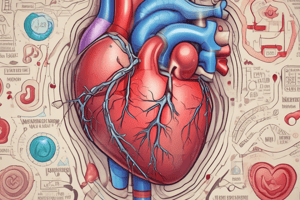Podcast
Questions and Answers
Which of the following medications is primarily used as an anticoagulant?
Which of the following medications is primarily used as an anticoagulant?
- Digoxin
- Aspirin
- Furosemide
- Warfarin (correct)
What is a common sign of left-sided congestive heart failure?
What is a common sign of left-sided congestive heart failure?
- Jugular vein distention
- Peripheral edema
- Cyanosis of limbs
- Pulmonary congestion (correct)
Which drug class can be utilized to manage both hypertension and heart failure?
Which drug class can be utilized to manage both hypertension and heart failure?
- Inotropic agents
- Antihypertensive drugs (correct)
- Statins
- Calcium Channel Blockers
Which of the following conditions is characterized by acute myocardial ischemia?
Which of the following conditions is characterized by acute myocardial ischemia?
What is a potential complication of untreated Deep Vein Thrombosis (DVT)?
What is a potential complication of untreated Deep Vein Thrombosis (DVT)?
Which medication among the following is classified as an inotropic agent?
Which medication among the following is classified as an inotropic agent?
Which condition is characterized by blood vessels becoming narrowed or blocked due to inflammation and thrombosis?
Which condition is characterized by blood vessels becoming narrowed or blocked due to inflammation and thrombosis?
What would be a critical indicator in the management of acute heart failure?
What would be a critical indicator in the management of acute heart failure?
Which drug is primarily utilized to treat conditions related to coronary arterial disease?
Which drug is primarily utilized to treat conditions related to coronary arterial disease?
Which of the following conditions is primarily associated with signs of decerebrate and decorticate posturing?
Which of the following conditions is primarily associated with signs of decerebrate and decorticate posturing?
Flashcards are hidden until you start studying
Study Notes
Cardiovascular Medications
- Diuretics: Promote fluid elimination; examples include Furosemide and Thiazide, used to treat hypertension and edema.
- Digoxin: Enhances heart contraction force and regulates heart rhythm; used in heart failure and atrial fibrillation.
- Aspirin: Antiplatelet drug that reduces blood clot formation, commonly prescribed for cardiovascular events.
- Calcium Channel Blockers: Relax blood vessels and reduce heart workload, commonly used to treat hypertension and angina.
- Morphine Sulfate: Analgesic and vasodilator used in acute cardiac issues to manage pain and reduce anxiety.
- Beta Adrenergic Blockers: Decrease heart rate and contractility; used for hypertension, heart failure, and arrhythmias.
- Inotropic Agents: Strengthen heart contractions; important in acute heart failure management.
- Metoprolol: A specific beta-blocker effective in reducing blood pressure and managing heart rhythm disorders.
- Warfarin/Anticoagulants: Prevent blood clots; critical in patients with atrial fibrillation or venous thromboembolism.
- Valproic Acid: Primarily an anticonvulsant, also affects cardiac function by stabilizing mood and preventing seizures.
- Calcium Gluconate: Used to prevent hypocalcemia; also effective in treating calcium deficiencies associated with cardiac issues.
- Protamine Sulfate: Antidote to heparin; used to reverse anticoagulation effects during surgery.
- Statins: Lipid-lowering medications to reduce cholesterol; important in preventing coronary artery disease.
- Nitroglycerin: Vasodilator that alleviates angina by increasing blood flow to the heart muscle.
- Amiodarone (Intravenous): Antiarrhythmic used to treat severe ventricular dysrhythmias.
- Antihypertensive Drugs: Include various classes—diuretics, ACE inhibitors, beta-blockers—aimed at controlling high blood pressure.
- Cardiac Drugs: A category encompassing various medications used to treat heart-related ailments.
Dysrhythmias
- Abnormal heart rhythms that can lead to various complications, requiring specific interventions based on the type.
Hypertension
- A chronic condition characterized by elevated blood pressure, increasing the risk for heart disease and stroke.
Congestive Heart Failure
- Right-Sided: Typically leads to fluid retention in the abdomen and extremities.
- Left-Sided: Results in pulmonary congestion and difficulty breathing.
- Can be acute or chronic in nature.
Head Injury Posturing
- Decerebrate Posturing: Arms and legs extended, indicating severe brain injury.
- Decorticate Posturing: Arms flexed, legs extended, suggesting damage to brain pathways.
Cardiovascular Laboratory
- Services include diagnostic testing to evaluate heart function, blood flow, and other cardiovascular parameters.
Management of Sickle Cell Anemia
- Involves pain management, hydration, and prevention of complications during a sickle cell crisis.
Cardiac Markers
- Biomarkers, such as troponins, that indicate heart muscle damage; essential for diagnosing myocardial infarction.
ECG Strip Interpretation
- Analysis of electrocardiograms to assess heart rhythms, detect abnormalities, and guide treatment.
Signs and Symptoms of Heart Failure
- Typical symptoms include fatigue, shortness of breath, and edema; crucial for early detection and intervention.
Cardiogenic Shock
- A life-threatening condition where the heart fails to pump enough blood, requiring immediate medical attention.
Infectious Cardiovascular Diseases
- Includes endocarditis and myocarditis; often associated with bacteria or viruses affecting the heart.
Analyzing Cardiac Rhythm Strip
- Involves identifying rhythms like atrial fibrillation, ventricular tachycardia, and understanding their clinical implications.
Acute Myocardial Ischemia
- A condition where blood flow to the heart is restricted, often leading to chest pain and potential infarction.
Cardiac Tamponade
- Accumulation of fluid in the pericardial space that restricts heart function; requires rapid intervention.
Myocardial Infarction
- Commonly known as a heart attack; results from prolonged ischemia and leads to heart tissue damage.
Rheumatic Fever/Rheumatic Heart Disease
- Complication of untreated streptococcal infections; can damage heart valves and lead to long-term heart disease.
Peripheral Vascular Disease
- Includes both peripheral arterial and venous disease, leading to reduced blood flow and potential limb ischemia.
Edema Assessment
- Evaluation of swelling, often indicating heart failure or fluid imbalance; important for management.
Thrombosis and Related Conditions
- Thrombosis: Formation of blood clots within vessels.
- Thromboembolism: Working of clots dislodging and causing blockages elsewhere.
- Thrombophlebitis: Inflammation of a vein associated with clot formation.
Buerger's Disease
- A rare disease affecting blood vessels, leading to restricted blood flow; often linked to smoking.
Leg Varicosities
- Dilated veins in the legs due to increased pressure; can lead to complications like ulcers.
Raynaud's Disease
- A vasospastic disorder resulting in color changes in fingers and toes, often triggered by cold.
Deep Vein Thrombosis (DVT)
- Formation of a clot in a deep vein, typically in the legs; requires prompt recognition and treatment.
Angina Pectoris
- Chest pain resulting from reduced blood flow to the heart muscle, indicating underlying ischemic heart disease.
Coronary Arterial Disease
- The buildup of plaques in coronary arteries leading to decreased blood flow to the heart, a major cause of heart attacks.
Aneurysms
- Abdominal Aortic Aneurysm: A dilation of the aorta in the abdomen; can be fatal if ruptured.
- Cerebral Aneurysm: Dilation in a cerebral artery; risk of hemorrhagic stroke if it ruptures.
Anemia
- A condition characterized by a deficiency of red cells or hemoglobin, impacting oxygen delivery to tissues.
Hemorrhagic Stroke
- Occurs due to bleeding in or around the brain, often requiring surgical intervention.
Ischemic Stroke
- Results from blood clots blocking blood vessels in the brain, leading to potential brain damage.
Acute Brain Attack
- Another term for stroke, emphasizing the urgent need for medical attention to prevent long-term disability.
Congestive Heart Failure / Pulmonary Edema
- Fluid accumulation in the lungs due to heart failure, presenting with shortness of breath and cough.
Cardiovascular Medications
- Diuretics: Promote fluid elimination; examples include Furosemide and Thiazide, used to treat hypertension and edema.
- Digoxin: Enhances heart contraction force and regulates heart rhythm; used in heart failure and atrial fibrillation.
- Aspirin: Antiplatelet drug that reduces blood clot formation, commonly prescribed for cardiovascular events.
- Calcium Channel Blockers: Relax blood vessels and reduce heart workload, commonly used to treat hypertension and angina.
- Morphine Sulfate: Analgesic and vasodilator used in acute cardiac issues to manage pain and reduce anxiety.
- Beta Adrenergic Blockers: Decrease heart rate and contractility; used for hypertension, heart failure, and arrhythmias.
- Inotropic Agents: Strengthen heart contractions; important in acute heart failure management.
- Metoprolol: A specific beta-blocker effective in reducing blood pressure and managing heart rhythm disorders.
- Warfarin/Anticoagulants: Prevent blood clots; critical in patients with atrial fibrillation or venous thromboembolism.
- Valproic Acid: Primarily an anticonvulsant, also affects cardiac function by stabilizing mood and preventing seizures.
- Calcium Gluconate: Used to prevent hypocalcemia; also effective in treating calcium deficiencies associated with cardiac issues.
- Protamine Sulfate: Antidote to heparin; used to reverse anticoagulation effects during surgery.
- Statins: Lipid-lowering medications to reduce cholesterol; important in preventing coronary artery disease.
- Nitroglycerin: Vasodilator that alleviates angina by increasing blood flow to the heart muscle.
- Amiodarone (Intravenous): Antiarrhythmic used to treat severe ventricular dysrhythmias.
- Antihypertensive Drugs: Include various classes—diuretics, ACE inhibitors, beta-blockers—aimed at controlling high blood pressure.
- Cardiac Drugs: A category encompassing various medications used to treat heart-related ailments.
Dysrhythmias
- Abnormal heart rhythms that can lead to various complications, requiring specific interventions based on the type.
Hypertension
- A chronic condition characterized by elevated blood pressure, increasing the risk for heart disease and stroke.
Congestive Heart Failure
- Right-Sided: Typically leads to fluid retention in the abdomen and extremities.
- Left-Sided: Results in pulmonary congestion and difficulty breathing.
- Can be acute or chronic in nature.
Head Injury Posturing
- Decerebrate Posturing: Arms and legs extended, indicating severe brain injury.
- Decorticate Posturing: Arms flexed, legs extended, suggesting damage to brain pathways.
Cardiovascular Laboratory
- Services include diagnostic testing to evaluate heart function, blood flow, and other cardiovascular parameters.
Management of Sickle Cell Anemia
- Involves pain management, hydration, and prevention of complications during a sickle cell crisis.
Cardiac Markers
- Biomarkers, such as troponins, that indicate heart muscle damage; essential for diagnosing myocardial infarction.
ECG Strip Interpretation
- Analysis of electrocardiograms to assess heart rhythms, detect abnormalities, and guide treatment.
Signs and Symptoms of Heart Failure
- Typical symptoms include fatigue, shortness of breath, and edema; crucial for early detection and intervention.
Cardiogenic Shock
- A life-threatening condition where the heart fails to pump enough blood, requiring immediate medical attention.
Infectious Cardiovascular Diseases
- Includes endocarditis and myocarditis; often associated with bacteria or viruses affecting the heart.
Analyzing Cardiac Rhythm Strip
- Involves identifying rhythms like atrial fibrillation, ventricular tachycardia, and understanding their clinical implications.
Acute Myocardial Ischemia
- A condition where blood flow to the heart is restricted, often leading to chest pain and potential infarction.
Cardiac Tamponade
- Accumulation of fluid in the pericardial space that restricts heart function; requires rapid intervention.
Myocardial Infarction
- Commonly known as a heart attack; results from prolonged ischemia and leads to heart tissue damage.
Rheumatic Fever/Rheumatic Heart Disease
- Complication of untreated streptococcal infections; can damage heart valves and lead to long-term heart disease.
Peripheral Vascular Disease
- Includes both peripheral arterial and venous disease, leading to reduced blood flow and potential limb ischemia.
Edema Assessment
- Evaluation of swelling, often indicating heart failure or fluid imbalance; important for management.
Thrombosis and Related Conditions
- Thrombosis: Formation of blood clots within vessels.
- Thromboembolism: Working of clots dislodging and causing blockages elsewhere.
- Thrombophlebitis: Inflammation of a vein associated with clot formation.
Buerger's Disease
- A rare disease affecting blood vessels, leading to restricted blood flow; often linked to smoking.
Leg Varicosities
- Dilated veins in the legs due to increased pressure; can lead to complications like ulcers.
Raynaud's Disease
- A vasospastic disorder resulting in color changes in fingers and toes, often triggered by cold.
Deep Vein Thrombosis (DVT)
- Formation of a clot in a deep vein, typically in the legs; requires prompt recognition and treatment.
Angina Pectoris
- Chest pain resulting from reduced blood flow to the heart muscle, indicating underlying ischemic heart disease.
Coronary Arterial Disease
- The buildup of plaques in coronary arteries leading to decreased blood flow to the heart, a major cause of heart attacks.
Aneurysms
- Abdominal Aortic Aneurysm: A dilation of the aorta in the abdomen; can be fatal if ruptured.
- Cerebral Aneurysm: Dilation in a cerebral artery; risk of hemorrhagic stroke if it ruptures.
Anemia
- A condition characterized by a deficiency of red cells or hemoglobin, impacting oxygen delivery to tissues.
Hemorrhagic Stroke
- Occurs due to bleeding in or around the brain, often requiring surgical intervention.
Ischemic Stroke
- Results from blood clots blocking blood vessels in the brain, leading to potential brain damage.
Acute Brain Attack
- Another term for stroke, emphasizing the urgent need for medical attention to prevent long-term disability.
Congestive Heart Failure / Pulmonary Edema
- Fluid accumulation in the lungs due to heart failure, presenting with shortness of breath and cough.
Studying That Suits You
Use AI to generate personalized quizzes and flashcards to suit your learning preferences.




